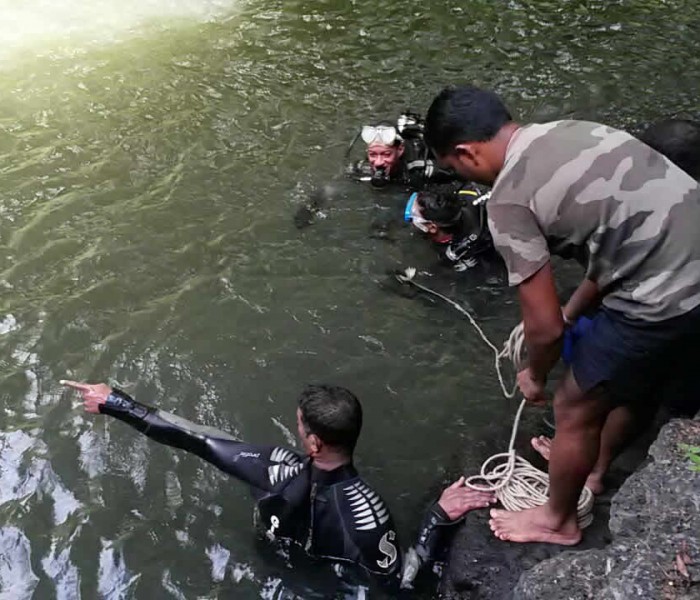Le Directeur des poursuites publiques (DPP) Satyajit Boolell a confirmé à Radio Plus mercredi après-midi 8 juin qu’il fera appel du jugement de la Cour suprême qui a renversé mercredi 25 mai le verdict de la cour intermédiaire condamnant Pravind Jugnauth à 12 mois de prison dans l’affaire MedPoint.
Le bureau du DPP a fait une demande à la Cour suprême « for leave to appeal to the Judicial Committee of the Privy Council ». Me Raouf Gulbul, l’un des avocats de Pravind Jugnauth, dans une déclaration à Radio Plus mercredi après-midi 8 juin, affirme qu’il attendait toujours les points d’appel du DPP. Il affirme toutefois que cela démontre que « les institutions sont vraiment libres et indépendantes à l’île Maurice ». L’avocat explique que le DPP devra d’abord demander l’autorisation de la Cour suprême pour pouvoir faire appel devant le Privy Council. En attendant que le procès en appel soit entendu devant les Law Lords, le jugement de la Cour suprême du chef juge Kheshoe Parsad Matadeen et du juge Asraf Caunhye mercredi 25 juin tient toujours. Pravind Jugnauth avait été condamné le 30 juin 2015 à 12 mois de prison par les magistrats Azam Neerooa et Niroshini Ramsoondar de la cour intermédiaire. Il avait été trouvé coupable de conflit d’intérêts sous la Prevention of Corruption Act (PoCA) dans le rachat de la clinique MedPoint par l’État en décembre 2010. Pravind Jugnauth était poursuivi pour avoir « approuvé, en tant que vice-Premier ministre et ministre des Finances, la réallocation de Rs 144,7 millions le 23 décembre 2010 au profit de MedPoint Ltd. La compagnie compte parmi ses actionnaires une proche de Pravind Jugnauth, à savoir sa sœur Shalini Devi Malhotra, née Jugnauth, et épouse du Dr Krishan Malhotra ». Le leader du MSM avait interjeté appel contre sa condamnation et avait démissionné de son poste de ministre de la Technologie, de la Communication et de l’Innovation. Blanchi par la Cour suprême mercredi 25 mai, Pravind Jugnauth a prêté serment comme ministre des Finances jeudi 26 mai, soit au lendemain du jugement de la cour d’appel.
Communiqué du bureau du DPP :
- The Office of the Director of Public Prosecutions has today lodged an application before the Supreme Court for leave to appeal to the Judicial Committee of the Privy Council, pursuant to section 81(2)(b) of the Constitution and section 70A of the Courts Act, against the judgment delivered by the Supreme Court on 25th May 2016 in the matter of Pravind Kumar Jugnauth v. Independent Commission against Corruption & Ors.
- The Director of Public Prosecutions (DPP) has had regard to the following factors in deciding to appeal to the Privy Council.
- The Supreme Court observed in its judgment that it was the first occasion on which the offence of Conflict of Interests, under section 13(2) of the Prevention of Corruption Act (POCA), has come before it for determination and this case raises fundamental legal issues relating to the interpretation of that offence.
- The Supreme Court’s judgment, which overturned the decision of the Intermediate Court, gives rise to important questions as regards the determination of guilt under section 13(2) of the POCA, inter alia: (a) the requisite degree of knowledge and criminal intent of a public official to establish an offence of Conflict of Interests, and whether good faith can be invoked as a defence; (b) the meaning of the term “personal interest” and whether it excludes the shareholding of the relative of a public official in a company; (c) the nature of participation in proceedings prohibited under that provision and whether a public official is precluded from taking any step in the execution of a contract which has been awarded by a public body to a company in which a relative of that public official has shares.
- The DPP is of the considered opinion that the above legal issues raises points of law of great general public importance, the final resolution of which is in the interests of the public and of the administration of justice in Mauritius.
- Moreover, the DPP has taken note that there are a number of cases either awaiting decision as to charge or awaiting trial, the final outcome of which will depend on the decisions of law made in this case.
- The DPP has therefore concluded, after careful review, and thorough internal consultations, that it is essential in the public interest and for the future development of the law in this vital area that these fundamental legal issues, on which the two courts have disagreed, should be referred to the Judicial Committee of the Privy Council for its ultimate decision.
08 June 2016
 Par
Defimedia .info, Defimedia.info
Par
Defimedia .info, Defimedia.info
 Par
Defimedia .info, Defimedia.info
Par
Defimedia .info, Defimedia.info
